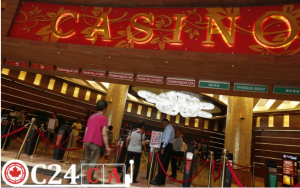The Social Impact of Casinos on Local Communities: Jobs, Tourism, and Economic Growth

Casinos have long been recognized as more than just places for gambling and entertainment. They play a significant role in the social and economic fabric of local communities, generating a range of positive impacts that extend beyond the casino floor. In this article, we will explore the social impact of casinos on local communities, focusing on the creation of jobs, the boost to tourism, and the contribution to economic growth. By examining these factors, along with understanding how to win Lucky Jet Casino Game, we can gain a deeper understanding of how casinos can bring about positive changes and opportunities for the communities they operate in.
As an expert in the world of gambling and a professional poker player, I have witnessed firsthand the transformative impact that casinos can have on local communities. Beyond the glitz and glamour, casinos play a pivotal role in shaping the social landscape, contributing to job creation, tourism promotion, and economic growth. In this article, we will delve into the profound social impact of casinos on local communities, exploring how they create opportunities, attract visitors, and drive economic development. By examining these aspects, we can truly appreciate the multifaceted role that casinos play in fostering vibrant and thriving communities.
With the rise of casinos in various regions, including Canada, the social impact has become even more evident. The establishment of casinos has far-reaching effects, going beyond the walls of the establishments themselves. They become catalysts for change, bringing about tangible benefits to the local population.
In this article, we will explore the social impact of casinos from three key perspectives: job creation, tourism, and economic growth. These factors intertwine to create a powerful synergy that positively influences the community as a whole. By understanding and recognizing the social impact of casinos, we can shed light on the opportunities and challenges that arise, allowing for informed decision-making and responsible casino development.
Join me as we delve into the remarkable social impact of casinos on local communities, uncovering the ways in which they transform lives, attract visitors, and foster economic prosperity. Together, we will gain a deeper appreciation for the power of casinos in shaping the social fabric of our communities and paving the way for a brighter future.
Job Creation:
One of the most notable social benefits of casinos is the creation of employment opportunities. Casinos are labor-intensive establishments, requiring a diverse range of staff to operate effectively. From dealers and floor managers to security personnel, hospitality staff, and administrative professionals, casinos provide a wide array of job options. These employment opportunities can have a significant impact, particularly in areas with limited job prospects or high unemployment rates. The jobs provided by casinos can enhance local economies, improve the standard of living for individuals, and reduce dependency on government assistance programs.
One of the most significant social impacts of casinos on local communities is the creation of employment opportunities. Casinos are labor-intensive establishments that require a diverse range of skilled and unskilled workers to operate effectively. Let’s explore the various job categories that casinos typically offer:
| Job Categories | Description |
| Gaming Staff | Dealers, croupiers, pit bosses, and gaming supervisors who oversee gaming operations. |
| Hospitality and Service | Waitstaff, bartenders, chefs, and kitchen staff responsible for providing excellent service. |
| Security and Surveillance | Staff responsible for ensuring the safety and security of the casino and its patrons. |
| Administrative and Support | Staff in roles such as accounting, human resources, marketing, and maintenance. |
| Ancillary Services | Employees in hotel, entertainment, restaurant, and retail sectors within the casino complex. |
The employment opportunities created by casinos have a significant impact on local economies. They provide individuals with a range of job options and can serve as a catalyst for economic growth. Moreover, the wages and benefits provided by the casino industry contribute to the overall prosperity of the community, improving the standard of living and reducing unemployment rates.
It is important to note that responsible casino development should include fair employment practices, opportunities for career advancement, and a commitment to employee well-being. By fostering a supportive work environment, casinos can have an even more positive social impact on local communities.
Tourism and Local Business Development:
Casinos are often major attractions that draw visitors from near and far. The presence of a casino can bolster tourism and attract a diverse range of visitors, both domestic and international. Tourists who visit casinos often spend money on accommodations, dining, shopping, and other local attractions, thus benefiting the broader hospitality and retail sectors. The influx of visitors can lead to the growth of local businesses and stimulate economic development in the surrounding area. Additionally, the revenue generated from tourism can be reinvested in local infrastructure and public services, further enhancing the overall quality of life for residents.
Casinos have the potential to significantly boost tourism in their surrounding areas, attracting visitors from near and far. This influx of tourists can have a ripple effect, stimulating local businesses and driving economic growth. Let’s explore the ways in which casinos contribute to tourism and local business development:
- Increased Visitor Numbers:
The presence of a casino can turn a location into a tourist destination. Casinos offer a unique form of entertainment that attracts a wide range of visitors, including domestic and international tourists. These visitors contribute to the local economy by spending money on accommodations, dining, shopping, transportation, and other recreational activities. The increase in visitor numbers benefits local businesses by creating a demand for their goods and services.
- Collaboration with Local Businesses:
Casinos often collaborate with local businesses to create a comprehensive and attractive visitor experience. This collaboration can take the form of partnerships with hotels, restaurants, entertainment venues, and retail outlets. By working together, casinos and local businesses can create package deals, promotions, and special offers that entice visitors to explore the wider community. This symbiotic relationship helps local businesses thrive and enhances the overall tourism appeal of the area.
- Job Creation and Economic Opportunities:
The growth of tourism driven by casinos creates a range of employment opportunities beyond the casino itself. Local businesses in the hospitality, retail, and service sectors experience increased demand for their products and services, leading to job creation. This employment growth contributes to the economic vitality of the community, providing residents with more opportunities for stable and fulfilling employment.
- Infrastructure Development:
The presence of a casino can lead to the development of infrastructure in the surrounding area. To accommodate the increased number of visitors, improvements may be made to transportation networks, including roads, public transportation, and parking facilities. These infrastructure developments not only support the casino but also benefit the local community by enhancing accessibility and convenience for residents and visitors alike.
- Community Investments:
Casinos often make significant financial contributions to the local community through taxes, licensing fees, and community investment initiatives. These contributions can support the development of public services, education, healthcare, and cultural programs. By reinvesting in the community, casinos contribute to the overall well-being and quality of life for residents.
The positive impact of casinos on tourism and local business development goes beyond the immediate revenue generated by the casino itself. By attracting visitors, collaborating with local businesses, creating employment opportunities, and investing in community initiatives, casinos can help foster economic growth and vitality within the local community.
Economic Growth and Revenue Generation:
The establishment of a casino can have a positive impact on the overall economic growth of a community. Casinos contribute to the local economy through various channels, including taxes, licensing fees, and partnerships with local businesses. The revenue generated from casinos can be directed towards public services, education, healthcare, and other community development initiatives. This injection of funds can enhance the provision of essential services and infrastructure, leading to an improved overall standard of living for residents. Additionally, the economic benefits generated by casinos can have a ripple effect, attracting additional businesses and investment to the area.
Casinos have a significant impact on the economic growth of local communities, contributing to revenue generation and driving economic development. Let’s explore how casinos play a role in fostering economic growth:
1. Direct and Indirect Economic Impact:
The establishment of a casino brings with it direct and indirect economic benefits. Directly, casinos generate revenue through gambling activities, including slot machines, table games, and sports betting. This revenue contributes to the local economy through taxes, licensing fees, and other regulatory requirements. Indirectly, the presence of a casino stimulates spending in local businesses, such as hotels, restaurants, retail stores, and entertainment venues. This multiplier effect generates additional economic activity and employment opportunities, benefiting the broader community.
2. Job Creation and Employment Opportunities:
Casinos are labor-intensive establishments that require a diverse range of skilled and unskilled workers to operate effectively. The employment opportunities created by casinos have a significant impact on the local economy. Beyond the direct jobs within the casino itself, there are additional employment opportunities in supporting industries, such as hospitality, transportation, and construction. The wages earned by casino employees contribute to the local economy, driving consumer spending and supporting other businesses.
3. Tax Revenue and Community Investment:
The operation of a casino generates tax revenue for local governments. This revenue can be reinvested in the community, supporting public services, infrastructure development, education, healthcare, and other essential programs. The influx of tax dollars provides local governments with the means to enhance the overall well-being and quality of life for residents. Additionally, casinos often engage in community investment initiatives, supporting local organizations, charities, and cultural programs.
4. Tourism Promotion and Destination Development:
Casinos are often major attractions that draw visitors from near and far. The presence of a casino can transform an area into a tourist destination, stimulating the local tourism industry. Visitors who come to gamble at the casino often spend money on accommodations, dining, shopping, and other local attractions. This spending supports local businesses, creates employment opportunities, and drives economic growth.
5. Business Expansion and Investment:
The establishment of a casino can attract additional businesses and investment to the area. Entrepreneurs may see the potential for growth in the local economy and choose to establish new ventures or expand existing businesses. The presence of a casino can create a vibrant business ecosystem, with a range of complementary businesses catering to the needs and preferences of casino visitors and local residents.
The economic impact of casinos extends far beyond the walls of the establishment itself. Through direct and indirect economic effects, job creation, tax revenue, community investment, tourism promotion, and business expansion, casinos contribute to the overall economic growth and prosperity of local communities.
Conclusion:
Through job creation, casinos provide individuals with a range of employment options, improving livelihoods and reducing unemployment rates. The presence of a casino can turn an area into a tourist destination, boosting tourism and stimulating local businesses. This, in turn, leads to economic growth, as visitors spend money on accommodations, dining, and other local attractions.
Moreover, casinos contribute to economic growth through direct revenue generation, tax contributions, and community investment. The revenue generated by casinos can be reinvested in public services, infrastructure development, education, healthcare, and cultural programs, enhancing the overall quality of life for residents.
The economic impact of casinos goes hand in hand with social benefits. The job opportunities created by casinos support families, provide stability, and empower individuals to build fulfilling careers. The tourism boost generated by casinos drives economic activity, stimulates local businesses, and fosters entrepreneurship. The revenue generated by casinos contributes to the financial health of local governments, enabling them to provide essential services and support community initiatives.
However, it is crucial to approach the development and operation of casinos with responsible practices in mind. While the social and economic benefits are evident, it is important to address potential challenges such as problem gambling, social inequality, and the need for sustainable development. Responsible casino development involves collaboration between the industry, regulators, and the community to ensure a balanced approach that maximizes the positive impact and minimizes potential negative consequences.
By recognizing the social impact of casinos on local communities, we can harness their potential for positive change and create environments that benefit both residents and visitors. It is through responsible and sustainable practices that we can fully harness the transformative power of casinos and ensure a brighter future for all.






